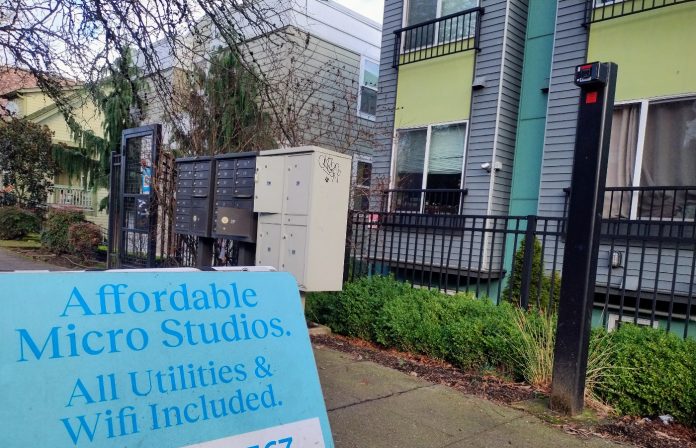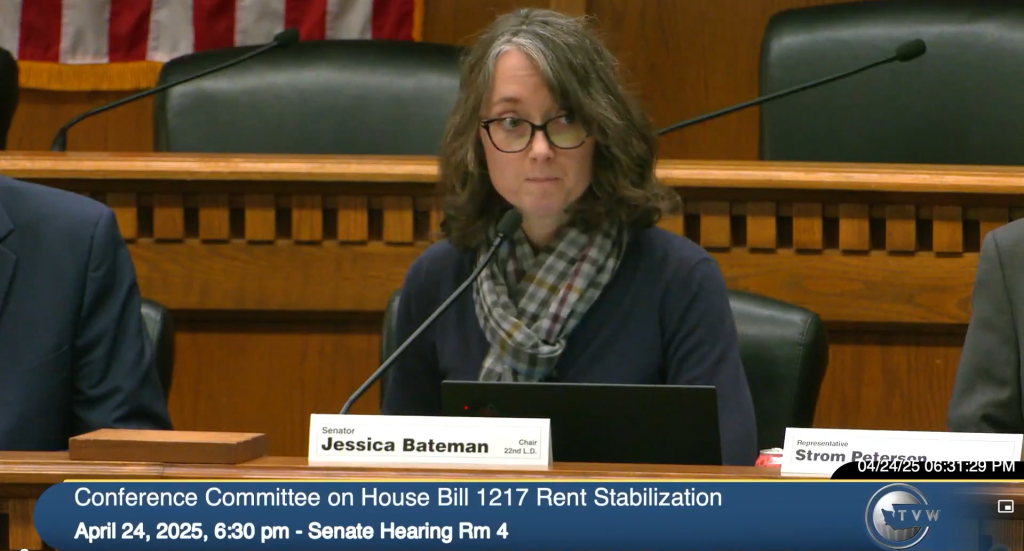
An amended rent stabilization bill approved Thursday night by a six-member legislative conference committee appears to represent a path to compromise between competing measures passed by the Washington State House and Senate. The legislation would protect renters from exorbitant rent increases, marking a major change of course for a legislature that banned rent control and stabilization statewide in 1981.
Under the compromise measure, annual rent hikes would be capped at 7% plus inflation, but with an overall ceiling of 10%. The Washington State Department of Commerce would publish an annual rent hike cap every summer, a practice similar to one that is already in place in the state of Oregon. For the following year, landlords would not be able to increase rent beyond that upper limit, somewhere in the range between 7% and 10%. Apartments in newer buildings (up to 12 years old) would be exempt, as well as tenants sharing a residence with their landlord.
The original version of House Bill 1217, which passed the House on March 10 on a 53-42 vote, included a 7% cap on annual rent increases. But it was amended on the Senate floor on April 10, raising the cap to 10% plus the annual rate of inflation, as defined by the national Consumer Price Index (CPI). If that cap had been in place in recent years, it would have meant a 18.9% cap for Washington renters in 2022 and 14.6% cap for 2023 — over twice as high as the original cap in the House version of the bill. The compromise version uses the Seattle metropolitan CPI rather than national CPI to measure inflation.
That Senate amendment, which was approved by a single vote margin, was a last-minute curveball that had the potential to doom the entire bill this year, with many House Democrats refusing to back a bill with a rent cap that high. Its sponsor, Senator Sharon Shewmake (D-42nd, Bellingham), cited concerns about the impact of rental price caps on the overall housing market and instead touted the potential for her amendment to protect against large, one-time rent increases.
The Senate also approved another floor amendment, from Marko Liias (D-21st, Edmonds) to exempt single-family homes owned by mom-and-pop landlords, but that provision has been stripped out of the compromise approved Thursday night. Critics argued that since the state lacks a registry of properties owned by corporate landlords it would have been difficult to limit the exemption to only small-time landlords.
Legislative leaders acknowledged the fact that the original 7% cap wasn’t able to be maintained, but framed the compromise as a concrete measure that will help renters now. The bill would take effect this summer.
“For a lot of folks, they’re going to be disappointed in the steps that we took today,” Senator Jessica Bateman (D-22nd, Olympia), chair of the conference committee that released the compromise, said ahead of the vote. “I do, however, believe that, on the whole, this bill will provide meaningful protections for Washingtonians and predictability, which for folks that are renting and don’t know what those rent increases will be, knowing and having that consistency and that predictability, I think is going to provide a lot of relief for people.”

The measure was opposed by the committee’s two Republican members, Rep. Sam Low (39th, Lake Stevens) and Sen. Keith Goehner (12th, Leavenworth). No GOP legislators had supported rent stabilization as it progressed through the House and Senate initially, citing concerns that rent hike caps would inhibit housing production and prompt smaller landlords to leave the housing market entirely.
“I do believe that the policy that’s before me tonight is going to be devastating for our housing providers, and we need housing providers to be a part of the solution in the housing crisis that we have, and I hope that we can find a way through this, to find some common ground so that we have a solution and that works for everybody, and not just one, one group over another,” Low said.
From the start of the session, Democratic legislators in both chambers have been touting rent stabilization as a policy with the significant potential to help tenants, but only if paired with additional measures that will help to increase the state’s housing supply. Ultimately, the legislature followed through, with significant housing policy bills also advancing to Governor Ferguson’s desk, including a transit-oriented development bill, parking reform, and condominium liability reform.
Ferguson has voiced support for rent stabilization and for housing supply bills that cut red tape.
The bill must now advance back through both the House and Senate ahead of the end of the legislative session at midnight on Sunday. With a significant attention over the weekend set to be devoted to finalizing the state’s three budgets, time will be a major issue that determines whether HB 1217 is able to make it across the finish line.
“I know that there will be many tenants around the state who will have wished for a stronger policy, but this bill brings important protections,” Representative Nicole Macri (D-43rd, Seattle) said ahead of the conference committee vote. “We know that housing costs continue to outpace income increases over time, and that families and individuals across our state are struggling to keep roofs over their head, to keep food on the table, to keep their children clothed and make sure they don’t go into medical debt, and this bill will make a tremendous improvement in the lives of our seniors, our families, our people living with disabilities who are struggling the most to be able to live in safe and stable housing.”
Ryan Packer has been writing for The Urbanist since 2015, and currently reports full-time as Contributing Editor. Their beats are transportation, land use, public space, traffic safety, and obscure community meetings. Packer has also reported for other regional outlets including Capitol Hill Seattle, BikePortland, Seattle Met, and PubliCola. They live in the Capitol Hill neighborhood of Seattle.


